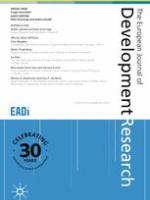Promoting development effectiveness in the Agenda 2030 era
Improving coordination among aid providers has long been an important prescription for more effective development cooperation. It is considered a means of reducing inefficiencies in aid delivery and contributing to stronger country level ownership of cooperation programmes. Coordination is not an end in itself, but a means to realizing joint action, such as analysis, division of labour or joint financing. Obstacles to fostering coordination exist on both sides of the development cooperation relationship. The changed setting for development cooperation characterized by growing diversity of goals, actors and approaches presents additional coordination challenges.
This article written by Erik Lundsgaarde and Niels Keijzer argues that the evolving context for development cooperation calls for a more expansive view of the concept of coordination. Rather than focusing on coordination as a government-to-government endeavour oriented around country-level processes, the authors indicate that coordination efforts should encompass a wider variety of stakeholders and governance levels. The article illustrates the emergence of broader approaches to coordination in development practice with the example of the Sustainable Energy for All initiative and its relationship to country-focused coordination approaches.

